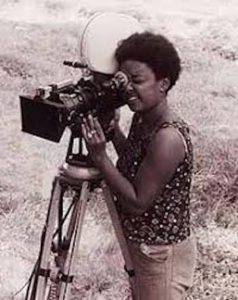
Sara Gómez
*Sara Gómez was born on this date in 1942. She was an Afro Cuban filmmaker.
Sara Gómez, aka Sarita Gómez, came from the folkloric Havana neighborhood of Guanabacoa. Her community was of Afro Cuban popular culture and a marginal sector of Cuba with many issues, such as racism and gender inequality. She studied music (piano), literature, and Afro-Cuban ethnography.
Raised by her paternal grandmother and four aunts, she grew up surrounded by Afro-Cuban professionals, including family members who played in the Havana Philharmonic Orchestra and attended dances at black recreational societies like the Porvenir and El Club Progreso (The Progressive Club), which inspired her studies at the Conservatory of Music in Havana.
Gómez was not poor or uneducated. Being brought up around scholars and art that shaped the culture around her, she used her voice to represent those who did not like those seen in her work. Gómez explored journalism by writing for the youth magazine Mella and the Communist Party newspaper Noticias de Hoy (News of Today) before taking a position at the newly formed Instituto Cubano Del Arte e Industria Cinematográficos (ICAIC). At the ICAIC, she became the first female film director in Cuba. Gómez made a series of documentary shorts on assigned topics before directing her first feature-length film. Cuban directors see documentaries as an essential training ground because they are forced to focus on the material reality of Cuba, consequently emphasizing filmmaking as an expression or tool of the culture.
Gómez directed multiple short documentaries that emphasized and criticized the Cuban revolutionary society. Her short films explored the positions of women and Afro-Cubans within society. She married fellow director Hector Veitia and had a daughter, Iddia. In 1967, on the set of Y Tenemos Sabor, she met Germinal Hernandez. She was the director, and he was a sound technician. They started an affair, later married, and had two children, Ibis and Alfredo. As a member of ICAIC (Cuban Institute of Cinematographic Art and Industry) during its early years, she was one of only two black filmmakers in attendance. She was the institute's first and, for her lifetime, Cuba's only woman director. Gómez is known for her first and final feature-length film, De Cierta Manera (One Way or Another) (1974). She was a revolutionary filmmaker concerned with representing the Afro-Cuban community, women's issues, and the treatment of the marginalized sectors of society.
Gómez's filmmaking identifies the problems of colonialism, experienced explicitly by previously marginalized communities (black people, women, poor, religious, and young people) who were unaware of the possibilities of a better future. "Exposing the roots of the world that had to be left behind and demanding the arrival of the future: her mission was to allow these communities to understand the process of what was happening in their lives, their needs, and possible departures." Gómez's work highlighted inequalities of social class, as well as racial and gender discrimination. She used her camera lens and ethnographic knowledge to narrate the histories of everyday lives in revolutionary Cuba. Sara Gomez died on June 2, 1974.